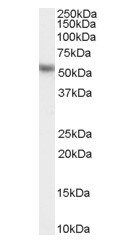Anti-KPNA2 antibody (ab6036)
Key features and details
- Goat polyclonal to KPNA2
- Suitable for: IHC-P, WB
- Reacts with: Human
- Isotype: IgG
Overview
-
Product name
Anti-KPNA2 antibody
See all KPNA2 primary antibodies -
Description
Goat polyclonal to KPNA2 -
Host species
Goat -
Tested Applications & Species
See all applications and species dataApplication Species WB Human -
Immunogen
Synthetic peptide corresponding to Human KPNA2 aa 518-529 (C terminal).
Sequence:QVQDGAPGTFNF
Database link: P52292 -
Positive control
- WB: HeLa Lysate; IHC-P: Human testis tissue.
-
General notes
GenBank Accession Number – NP_002257.The import of proteins into the nucleus is a process that involves at least 2 steps. The first is an energy-independent docking of the protein to the nuclear envelope and the second is an energy-dependent translocation through the nuclear pore complex. Imported proteins require a nuclear localization sequence (NLS) which generally consists of a short region of basic amino acids or 2 such regions spaced about 10 amino acids apart. Proteins involved in the first step of nuclear import have been identified in different systems. These include the Xenopus protein importin and its yeast homolog, SRP1 (a suppressor of certain temperature-sensitive mutations of RNA polymerase I in Saccharomyces cerevisiae), which bind to the NLS. KPNA2 protein interacts with the NLSs of DNA helicase Q1 and SV40 T antigen and may be involved in the nuclear transport of proteins. KPNA2 also may play a role in V(D)J recombination.
Properties
-
Form
Liquid -
Storage instructions
Shipped at 4°C. Upon delivery aliquot and store at -20°C or -80°C. Avoid repeated freeze / thaw cycles. -
Storage buffer
pH: 7.30
Preservative: 0.02% Sodium azide
Constituents: Tris buffered saline, 0.5% BSA -
 Concentration information loading...
Concentration information loading... -
Purity
Immunogen affinity purified -
Purification notes
Purified from goat serum by ammonium sulphate precipitation followed by antigen affinity chromatography using the immunizing peptide. -
Primary antibody notes
The import of proteins into the nucleus is a process that involves at least 2 steps. The first is an energy-independent docking of the protein to the nuclear envelope and the second is an energy-dependent translocation through the nuclear pore complex. Imported proteins require a nuclear localization sequence (NLS) which generally consists of a short region of basic amino acids or 2 such regions spaced about 10 amino acids apart. Proteins involved in the first step of nuclear import have been identified in different systems. These include the Xenopus protein importin and its yeast homolog, SRP1 (a suppressor of certain temperature-sensitive mutations of RNA polymerase I in Saccharomyces cerevisiae), which bind to the NLS. KPNA2 protein interacts with the NLSs of DNA helicase Q1 and SV40 T antigen and may be involved in the nuclear transport of proteins. KPNA2 also may play a role in V(D)J recombination. -
Clonality
Polyclonal -
Isotype
IgG -
Research areas
Images
-
Anti-KPNA2 antibody (ab6036) at 0.03 µg/ml + HeLa lysate (RIPA buffer) at 35 µg
Predicted band size: 58 kDa
Observed band size: 55 kDa why is the actual band size different from the predicted?Primary incubation 1 hour. Detected by chemiluminescence.








